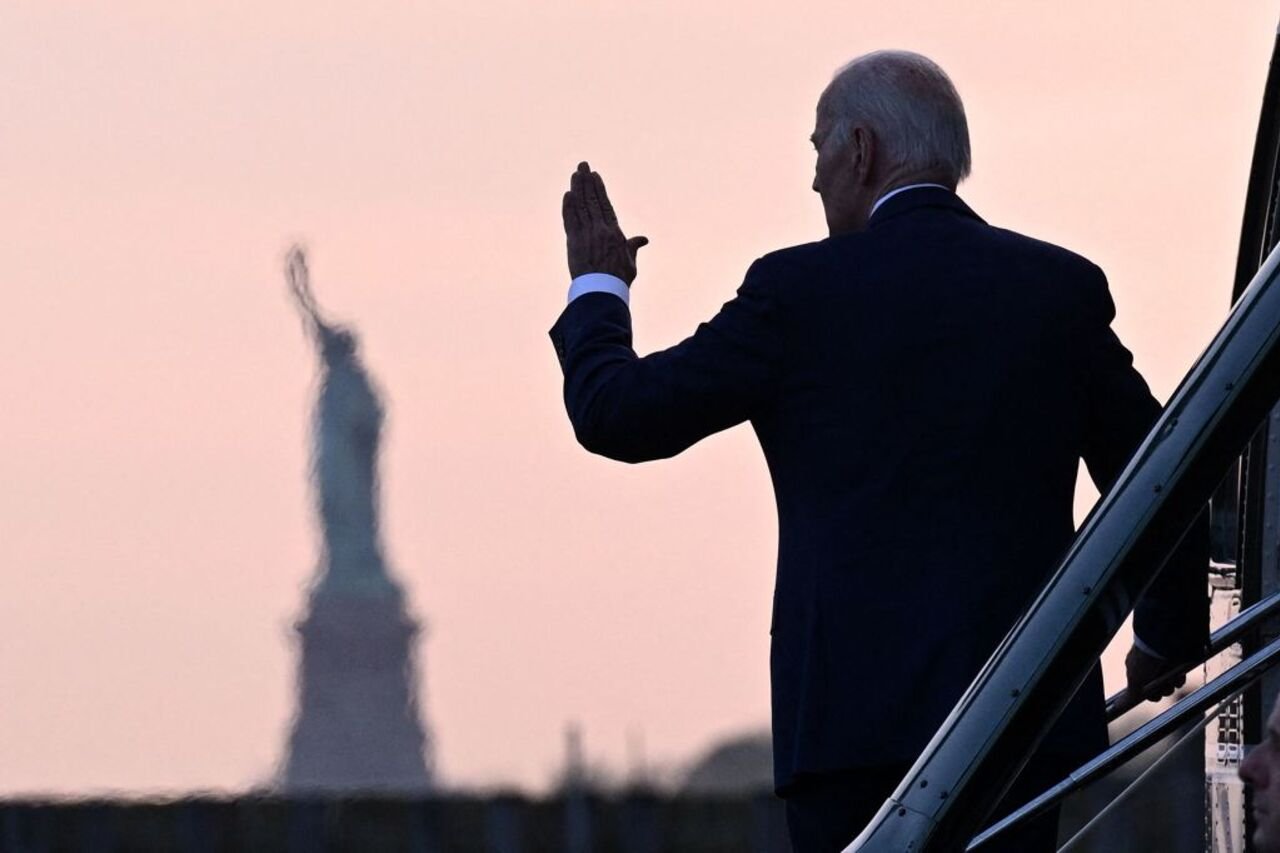From Delaware councilman to American president, Biden’s ascent and exit at the peak will be celebrated at the Democratic National Convention.
Before the 1972 election, Nordy Hoffman of the Democratic Senatorial Campaign Committee got a call from a young councilman from New Castle County, Delaware, seeking the party’s support for his U.S. Senate race. The young man confidently declared, “The Bidens are going to be the Kennedys of Delaware.”
A bemused Hoffman, who was an All-American football player at Notre Dame under famed coach Knute Rockne, and who would go on to become the Senate’s sergeant-at-arms, passed the message along to Ted Kennedy, then a Massachusetts senator from that storied political family.
Tonight at the Democratic National Convention in Chicago, that former local councilman from Delaware will be celebrated for a career that culminated with eight years as vice president and four years as president of the United States. He’ll get a well-deserved, enthusiastic, and even emotional reception – one befitting more than a half-century of devoted public service.
Joseph Robinette Biden Jr.’s journey has seen extraordinary peaks and painful valleys, right up till a month ago, when, under pressure from Democratic Party leaders, he reluctantly dropped out of a reelection race that his dismal debate performance and polls foretold he was destined to lose.
That he’s speaking Monday night to an audience grateful that he stepped aside for a younger Democrat with better odds is a gift to him and his legacy. Vice President Kamala Harris, who replaced Biden at the top of the ticket, has at least an even chance – perhaps better – of defeating former President Donald Trump, and Biden will play a minimal role in her campaign.
Biden’s extensive domestic and foreign policy accomplishments – from steering the nation out of the COVID-19 pandemic to shepherding through a major infrastructure bill to leading the global coalition to support Ukraine since Russia’s invasion in 2022 – land him “easily in the top three” of the 24 one-term presidents in American history, says Lindsay Chervinsky, executive director of the George Washington Presidential Library at Mount Vernon and a presidential historian. Unlike most of those, Biden “will be celebrated for what he did, rather than didn’t do,” she said, referring to his list of accomplishments, not just his unfinished wish list.
She adds one important caveat: The outcome of the November election will likely determine how history sees him, at least as much as what he accomplished in his own four years at the top, because “presidential legacies are often defined by what comes after.”
Biden’s journey started in 1972 when he was a 29-year-old who managed to defeat an incumbent GOP senator during a banner election for Republicans. A month after that stunning victory, tragedy hit. Biden’s wife Neilia and 1-year-old daughter Naomi were killed in an automobile accident, which also badly injured his two young sons, Beau and Hunter.
The Senate majority leader at the time, Montana Democrat Mike Mansfield, had to persuade a grieving Biden to take up the Senate seat he had just won.
In his early years in the chamber, Biden seemed to be carrying a heavy weight. “You can’t imagine the courage that young man displayed,” Mansfield, who led the Senate Democratic caucus from 1961 to 1977, told me years later.
By the 1980s, Biden became the top Democrat on the Senate Judiciary Committee. He decided to run for president in 1987, a campaign that started with promise, but cratered, ending when he was caught having plagiarized from a speech by a British politician. Months later, he had a brain aneurysm.
He bounced back – resilience is a Biden hallmark – and became a force to reckon with on the Senate Foreign Relations Committee, and eventually chairman of the judiciary panel. But Republicans ran circles around him and he capitulated too much to them during the controversial confirmation hearings for Supreme Court Justice Clarence Thomas.
Two decades after his first White House bid, after his standing in the Senate had risen higher, Biden ran for president again in 2007, only to fall short once more, with a dismal fifth-place finish in the first test at the Iowa caucuses, after which he dropped out.
But the luck of the Irish was with Biden: A young senator named Barack Obama won the nomination and went on to choose Biden to be his vice presidential running mate in August of 2008. Biden was finally part of a winning ticket, even if he wasn’t at the top of it.
In 2015, late in Obama’s second term, Biden set his presidential ambitions aside after his older son, Beau, lost his battle with brain cancer. Beau was his father’s political heir apparent, who rose from Delaware attorney general to Democratic candidate for governor of the state when he died. His death was a major factor as to why Biden did not run in the 2016 contest when the post-Obama Democratic presidential nomination went to former Secretary of State Hillary Clinton.
To the astonishment of most politicians, Biden bounced back to win the Democratic nomination in 2020, after getting clobbered in the first three contests (Iowa, New Hampshire, and Nevada); he turned his luck around during the South Carolina primary and sailed on to the nomination. Democratic voters came out in high numbers relative to 2016, clinching Biden a clear victory in both the popular vote and the Electoral College, no matter Trump’s false claims to the contrary.
As president, Biden’s achievements don’t compare to the sweeping domestic policy programs of Franklin Roosevelt’s New Deal or Lyndon Johnson’s Great Society, but they have been significant: critical relief from the COVID-19 pandemic, a major infrastructure bill, a modest gun control measure, a big investment in manufacturing semiconductors in America and a move to reduce greenhouse emissions. All in just three-and-a-half years.
On foreign policy, Biden’s call to withdraw from Afghanistan was the right one but it was handled, at great cost to Afghans whose nation fell to the Taliban as U.S. troops withdrew, and to America’s reputation as a reliable ally. In the Middle East, he has placed too much trust in Israeli Prime Minister Benjamin Netanyahu. But his foreign policy triumphs – leading the alliance against the Russian invasion of Ukraine and forging alliances in Asia to counter Chinese aggression there – are major accomplishments.
By the start of the summer, the two biggest criticisms against his administration, immigration and inflation, were moving in the right direction. But voters didn’t want to reelect an 81-year-old, and his already difficult prospects were doomed after a disastrous debate against Trump on June 27.
Tonight’s swan song moment for Biden has not come without drama. His longtime aide Anita Dunn has complained bitterly that Democratic leaders, especially his close friend and former House Speaker Nancy Pelosi, had no right to pressure him to get out of the race. But Pelosi wasn’t wrong to prioritize a Democratic win to prevent a Trump return to the White House – and with Biden on the ticket, that wasn’t going to happen. Everyone except Biden and his inner circle knew that, and they were wrong to second-guess Pelosi’s legendary political instincts.
When Biden was first elected to the Senate, I was a young Wall Street Journal reporter covering Kennedy’s campaign. When Kennedy stopped in Delaware to stump for the unknown Biden, I wondered aloud if it was a wasted trip. No, Kennedy replied, “This kid is special.”
He got that right.
Washington columnist Albert R. Hunt has covered U.S. politics and presidential campaigns since 1972, previously for the Wall Street Journal, Bloomberg News, and the International New York Times. You can listen to his weekly podcast and read more on Substack.










Leave a Reply